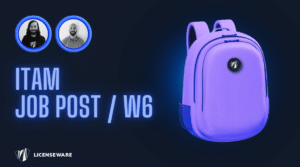The Hire and License Out (HALO) Effect

Since AI became mainstream, a new type of transaction has emerged that is fundamentally changing how tech giants acquire talent and technology. These deals, dubbed “HALO” transactions, an acronym for “Hire and License Out”, represent a novel approach to talent acquisition that shares characteristics of both traditional hiring and corporate acquisitions, yet isn’t quite either[1].
The term was coined by venture capitalist Kevin Kwok in his July 2025 analysis of this emerging trend, noting that these deals create a situation where “people with halos have left their bodies to live somewhere in the cloud giants”[2]. This poetic description captures the essence of what has become one of the most significant developments in AI industry consolidation.
The Anatomy of HALO Deals
HALO transactions follow a distinctive pattern that sets them apart from traditional mergers and acquisitions. In these arrangements, a core team from an AI startup, typically including founders and key research personnel, are hired by a major technology company. Simultaneously, the acquiring company secures a non-exclusive license to the startup’s intellectual property in exchange for substantial licensing fees that are distributed as dividends to the startup’s investors and employees[3].
The most striking aspect of these deals is that the startup continues operating under new leadership, creating what Kwok describes as a “chimeric deal structure” that is “legally and logistically hiring” but provides “the financial return of an acquisition” to investors and employees[4].
This structure has been employed by some of the most prominent names in AI over the past year. Microsoft’s 650 million deal with 2.7 billion agreement with Character.AI in August 2024, bringing back co-founders Noam Shazeer and Daniel De Freitas to the company where they had previously worked[6]. Amazon executed similar deals with both Adept AI and Covariant, paying at least $330 million and an undisclosed amount respectively for talent and technology licenses[7][8].
The Economics Behind the Trend
The emergence of HALO deals reflects several converging factors in the current AI landscape. Most fundamentally, these transactions acknowledge that in the AI sector, human capital has become more valuable than traditional corporate assets. As Kwok observes, “The market, especially in AI, increasingly views the value of companies to be their people not their customers, product, or IP”[9].
This shift is driven by the unique characteristics of AI development, where there exists “a relatively small set of people who have built the experience and intuitions from building at the frontiers of scale that are sought by top companies who all share similar needs”[10]. The scarcity of this talent, combined with the enormous strategic value that AI capabilities represent for major technology companies, has created a market dynamic where traditional hiring approaches prove insufficient.
The financial scale of these deals reflects this reality. Google’s $2.4 billion payment for Windsurf talent in July 2025 represents just the latest example of how far companies are willing to go to secure key AI researchers and engineers[11]. These amounts far exceed what would typically be paid in traditional hiring scenarios, but they pale in comparison to the potential value that AI leadership could generate for companies worth trillions of dollars.
Regulatory Scrutiny and Legal Challenges
The rapid proliferation of HALO deals has not gone unnoticed by regulators. The Federal Trade Commission has opened investigations into multiple transactions, including Microsoft’s Inflection deal and Amazon’s Adept arrangement[12][13]. Similarly, the Department of Justice is probing Google’s Character.AI agreement[14]. UK regulators have also scrutinized these transactions, though they ultimately cleared Microsoft’s Inflection deal in September 2024[15].
The regulatory concern centers on whether these deals represent an attempt to circumvent traditional merger review processes. By structuring transactions as hiring and licensing arrangements rather than acquisitions, companies may be avoiding the disclosure requirements and antitrust scrutiny that would typically apply to deals of this magnitude.
However, as Kwok argues, it would be “a mistake to think of HALOs as otherwise normal acquisitions contorted into a bizarre form. They are in fact hiring”[16]. This perspective suggests that HALO deals represent a more honest acknowledgment of what these transactions actually accomplish, the acquisition of talent rather than companies.
The Broader Implications for Silicon Valley
Beyond their immediate impact on the companies involved, HALO deals signal a broader transformation in how Silicon Valley values and structures business relationships. These transactions represent what Kwok describes as “an effort to preserve the social contract in a changed environment”[17]. Rather than abandoning the traditional expectation that successful outcomes should benefit all stakeholders, founders, employees, and investors, HALO deals attempt to maintain this principle while adapting to new market realities.
The speed at which these deals close represents another significant departure from traditional M&A processes. While conventional acquisitions can take months to complete and often fail due to regulatory uncertainty, HALO transactions can be finalized in days[18]. This efficiency reflects both the urgency of the AI talent competition and the structural advantages of avoiding traditional acquisition processes.
Challenges and Future Evolution
Despite their apparent success in achieving their immediate objectives, HALO deals face several challenges that may limit their long-term viability. The tax treatment of these transactions is “extremely tax inefficient,” as licensing fees are taxed as income rather than capital gains[19]. This creates a significant financial disadvantage compared to traditional acquisitions.
Additionally, the legal and structural complexity of these deals means they remain “poorly understood” and lack the standardization that would make them more widely adoptable[20]. Kwok suggests that HALO deals are currently “in a messy primordial form closer to Convertible Notes than to SAFEs,” indicating significant room for improvement in their structure and terms[21].
The regulatory environment also presents ongoing uncertainty. As government agencies continue to investigate existing deals and potentially challenge future ones, companies may need to develop new approaches or risk having their talent acquisition strategies constrained.
The emergence of HALO deals represents a fascinating case study in how market forces and regulatory constraints can drive innovation in corporate structure and deal-making. These transactions reflect the unique dynamics of the AI industry, where talent scarcity and the strategic importance of AI capabilities have created conditions that traditional hiring and acquisition models struggle to address.
While HALO deals may prove to be a temporary phenomenon specific to the current AI boom, they also point toward broader trends in how technology companies value and acquire human capital. As Kwok concludes, “HALOs aren’t destroying Silicon Valley. They are a leading signal of the shift towards valuing people more than their companies”[22].
Whether this trend continues will depend on how successfully companies can navigate regulatory challenges, improve the structural efficiency of these deals, and demonstrate that they truly serve the interests of all stakeholders involved. What seems certain is that the AI talent wars have fundamentally changed the playbook for how the world’s most valuable companies compete for the human capital that will define the future of technology.
References
[1] Kwok, Kevin. “The HALO Effect.” Kwok Chain, July 15, 2025. https://kwokchain.com/2025/07/15/the-halo-effect/
[2] Ibid.
[3] Ibid.
[4] Ibid.
[5] Reuters. “Microsoft pays Inflection $650 mln in licensing deal while hiring its staff.” March 21, 2024. https://www.reuters.com/technology/microsoft-agreed-pay-inflection-650-mln-while-hiring-its-staff-information-2024-03-21/
[6] Reuters. “Google hires top talent from startup Character.AI, signs licensing deal.” August 2, 2024. https://www.reuters.com/technology/artificial-intelligence/google-hires-characterai-cofounders-licenses-its-models-information-reports-2024-08-02/
[7] CNBC. “Amazon hires execs from AI startup Adept and licenses its technology.” June 28, 2024. https://www.cnbc.com/2024/06/28/amazon-hires-execs-from-ai-startup-adept-and-licenses-its-technology.html
[8] GeekWire. “Amazon hires Covariant founders, inks AI licensing deal.” August 30, 2024. https://www.geekwire.com/2024/amazon-hires-covariant-founders-inks-licensing-deal-with-robotics-ai-startup-in-latest-reverse-acquihire-deal/
[9] Kwok, Kevin. “The HALO Effect.” Kwok Chain, July 15, 2025.
[10] Ibid.
[11] Reuters. “Google hires Windsurf execs in $2.4 billion deal to advance AI ambitions.” July 12, 2025. https://www.reuters.com/business/google-hires-windsurf-ceo-researchers-advance-ai-ambitions-2025-07-11/
[12] Forbes. “Microsoft’s Deal With Inflection AI Under Antirust Investigation.” June 6, 2024. https://www.forbes.com/sites/siladityaray/2024/06/06/ftc-is-reportedly-probing-microsofts-deal-with-inflection-ai/
[13] Reuters. “Exclusive: FTC seeking details on Amazon deal with AI startup Adept, source says.” July 16, 2024. https://www.reuters.com/technology/ftc-seeking-details-amazon-deal-with-ai-startup-adept-source-says-2024-07-16/
[14] Reuters. “Google faces DOJ probe over Character.AI deal, Bloomberg Law reports.” May 22, 2025. https://www.reuters.com/business/google-faces-doj-probe-over-deal-ai-tech-bloomberg-law-reports-2025-05-22/
[15] Reuters. “UK clears Microsoft’s partnership with Inflection AI.” September 4, 2024. https://www.reuters.com/technology/artificial-intelligence/uk-clears-microsofts-partnership-with-inflection-ai-2024-09-04/
[16] Kwok, Kevin. “The HALO Effect.” Kwok Chain, July 15, 2025.
[17] Ibid.
[18] Ibid.
[19] Ibid.
[20] Ibid.
[21] Ibid.
[22] Ibid.










